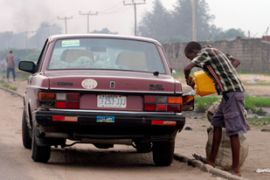Nigeria strike enters second day
Oil exports remain unaffected though much of the country comes to a standstill.

It has paralysed most economic activity in the country, including general cargo ports, government offices, schools, banks and many private businesses closed for the second day.
But unions have allowed essential operations in the oil industry, which is the country’s economic lifeline, to continue.
Peter Akpatason, the head of the NUPENG oil union, said the strike would intensify as time went on.
“Basically the members are complying. As usual, with time, the strike will begin to affect new areas. Production and exports are the last areas to be affected. Since we are in the second day and the government has not moved definitely we have to push deeper and deeper,” he said.
Speculation on oil production or export cuts from Africa‘s biggest producer of crude has caused uncertainty among motorists unable to fill up their cars – forcing an increased number of workers to stay at home.
Many flights have also been cancelled as airlines feared they would be unable to refill their jets with fuel after they arrived at their destination.
Markets for essential items stayed open, however, and there were no signs of scarcities for food, although prices were rising as demand gained on supply.
Streets deserted
Streets in the main cities were deserted, partly due to an earlier five-day-old strike by road tanker drivers which has left most of the country without fuel.
Some international and domestic flights had been cancelled because of a shortage of jet fuel.
Unionists barricaded streets in Port Harcourt, Nigeria‘s southern oil capital, and ejected workers who turned up for work at government offices in the capital, Abuja.
Yar’Adua agreed to reverse the tax increase and to implement a public sector pay rise as demanded by the unions, but talks broke down over the fuel price.
Unions rejected the government’s offer to reduce pump prices by four cents a litre, saying only a full reversal of its 10-naira increase would stop the strike.
Corrupt government
Nigeria is one of the world’s leading crude producers, but virtually all of its petrol is now imported after years of corruption, mismanagement and violence rendered refineries inoperable.
Heavy government subsidies keep re-imported petroleum products cheap in a country whose citizens complain they get little else in the way of services from a corrupt government.
Unions launched their strike on Wednesday in the hope of forcing the government to roll back a 15 per cent increase on automobile fuel.
Oil receipts account for about 80 per cent of the Nigerian government’s revenue and the unions are threatening to close the taps of Nigeria‘s energy industry, sending crude prices towards nine-month highs on international markets.